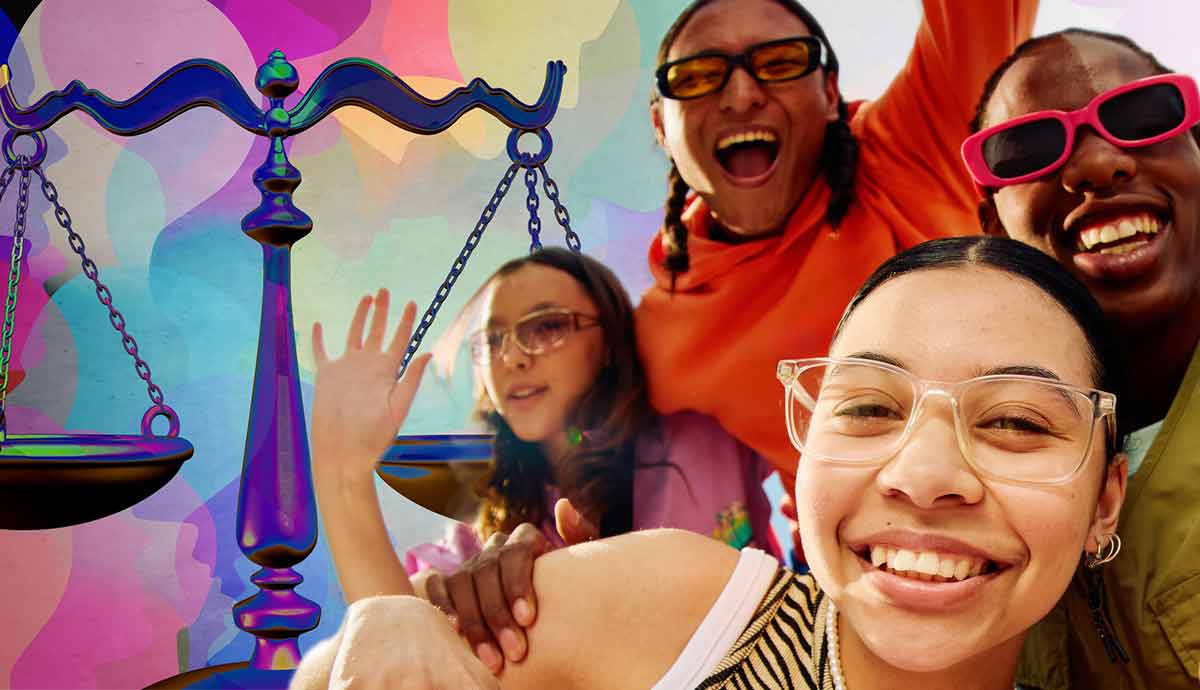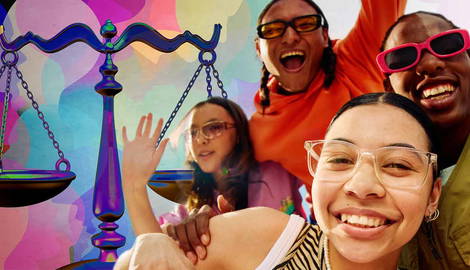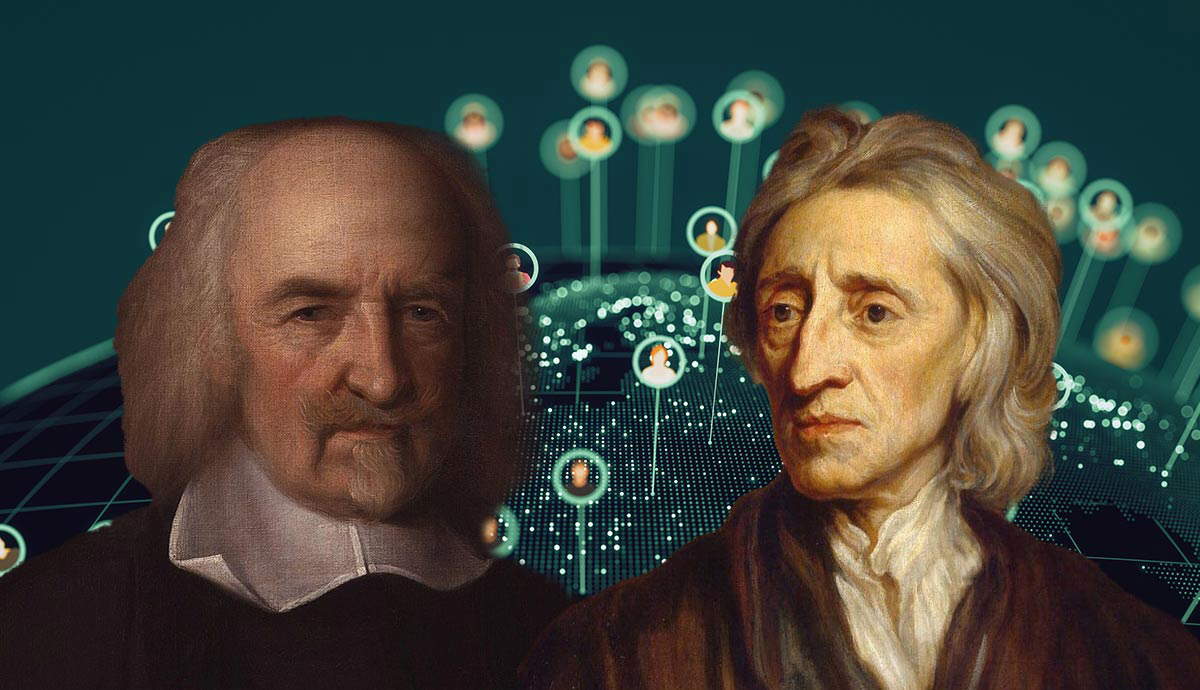
As society advances from one generation to the next, it bases its direction on transforming values and morals—and Gen Z has some unique circumstances for its transformation. Growing up with global internet access and heightened social engagement, today’s teens and twenty-somethings are creating new standards for what’s right. But what are the ideals and morals that they are fighting for?
Who Are Gen Zers?

Gen Z, short for Generation Z, refers to individuals born between 1997 and 2010. This generation follows the Millennials and comes before Generation Alpha. They are sometimes called “digital natives” because technology has always been part of their lives.
Today’s young people can’t imagine living without smartphones, social media, or constant internet access – things previous generations remember growing up without. This has profoundly influenced how they make friends (most often online), learn new skills, and spend their free time hanging out.
One area where Gen Z differs from older age groups is its attitudes toward fairness and diversity. They embrace multiculturalism more than any cohort before them. Plus, they care about many other types of equality besides race or religion alone.
Many members of this generation are highly educated. They’re admired for being pragmatic self-starters whose values have been shaped by events such as COVID-19 and economic instability during their formative years.
When it comes to morals and ethics, they’ve grown up in a digitally native world. Transparency and authenticity matter hugely to them—whether that’s in everyday interactions or knowing what’s really going on in people’s lives at home. But what does it all mean?
Equality and Social Justice

First, Generation Z is making itself heard on fairness and equality like never before. They’re not just talking about it; they’re making changes—whether in how people of different races or sexualities are treated or simply what’s considered acceptable behavior among their friends.
In fact, the desire for a level playing field influences many aspects of their lives. This age group feels strongly about supporting brands that appear to celebrate differences. Social media enables them to tell others when they think offline events or conversations are unfair.
Nor do expectations around these issues change when members start jobs. Rather, they want employers who promote diversity at all levels within the company (so there isn’t an all-male or all-white management team, for example).
And it’s not only work. Young workers also consider politics alongside personal relationships, supporting both new laws designed to give everyone an equal chance and politicians from any party who seem to be trying hard to achieve that aim.
Finally, Gen Z addresses equality using a blend of modern philosophies. They mix ideas from classic liberalism with newer notions like intersectionality. Instead of seeing justice as something that’s fixed and doesn’t move, members of this generation believe it’s an ongoing job – one which they have to keep working at and thinking about all the time.
When they question old power structures, Gen Z members are part of a broad philosophical shift that seeks to rethink what fairness means in a world where we are all interconnected (globalised). More than being concerned with whether things are simply fair from a theoretical point of view, Gen Z members wonder if there needs to be fairness in how justice (or lack thereof) is felt by everybody.
Environmental Concerns and Sustainability

Second, Generation Z is known for caring deeply about the environment and wanting to create a sustainable world. In fact, they see this not just as a challenge but as something that defines their generation.
You can tell how much young people worry about these issues by how they live and shop. This shift could change the future for all of us.
One example is veganism: Many under-25s are choosing plant-based diets, which doesn’t just mean they avoid things grown in fields. They want to eat stuff that hasn’t used loads of energy or caused suffering to animals—hence the carbon footprint mentioned.
It’s not just about what we consume directly from nature, either. Many Gen Z folks prefer home-grown products free from chemicals, too. Just because something doesn’t burn fossil fuels doesn’t mean it isn’t harmful!
That goes some way towards explaining why an increasing number of youngsters would rather use an electric car, ride a bike, or get around using public transport.
The reasoning behind these options is based on a belief in stewardship—taking care of the Earth and ensuring it is healthy for future generations. Gen Z also feels a strong sense of ethics. They think we have a moral duty to be sustainable because it affects others later on.
Philosophically, they embrace an ecological mindset that goes beyond just themselves. They believe their routine actions can help secure Earth’s well-being for future centuries—a way of thinking that treats environmental practices as both sensible and vital.
Transparency and Authenticity

Importantly, Generation Z values authenticity and transparency highly. They expect these qualities in all areas of their lives, including personal relationships, politics, and business. Their desire for honesty and openness is reshaping society and influencing how organizations behave.
When it comes to friendships or romance, members of Gen Z want connections that are real. They prefer conversations where everything is out in the open and being emotionally truthful over having surface-level chats.
This also extends to their digital lives—they like social media trends that involve posting unedited or “raw” content because it shows who you really are rather than what you want people to think. They’re even encouraging famous people or internet stars to embrace this side of themselves more frequently.
Companies are feeling pressure from Generation Z in the business world to be more open about their operations, supply chains, and treatment of workers—rather than simply paying lip service to environmental concerns. They want proof that a firm is as good as it says it is. This means clear information about everything, from where products come from to how companies behave.
At a philosophical level, Gen Z’s search for authenticity has roots in existentialism. Existentialism is a branch of thinking that was popularized by Jean-Paul Sartre and Martin Heidegger, among others. It argues that we should act according to our own beliefs and be responsible for our actions.
Authenticity isn’t just something nice for Gen Z to do if they fancy it. It is an ethic that communities need if they want trust and integrity to thrive in complex times.
Inclusivity and Diversity

Moreover, Generation Z is known for its strong advocacy of inclusivity and diversity. They do not simply tolerate differences among people; rather, they embrace and revel in them.
To Gen Zers, having a range of perspectives—whether through race, religion, or another lens—is important. They believe it fuels creativity and helps individuals learn more about one another in a community or workplace.
You can see how much emphasis Gen Z puts on inclusivity by looking at their daily activities. They might support an event that showcases different cultures or identities—think LGBTQ+ pride festivals or multicultural fairs—by showing up…and having fun!
Members of Gen Z want everyone’s voice to be heard in schools and offices, too, and they are calling for policies that reflect this belief.
Not only do young people from Generation Z want diversity to be represented in terms of ethnicity and sexuality, but they also expect to see a range of gender identities and body types, for example. And they want brands to use their clout to help drive social change.
If you’re looking for the philosophy behind this way of thinking, consider pluralism and cosmopolitanism: the idea that all cultures are worthy of respect in a globalized world.
Cosmopolitanism argues that differences can make human interactions more valuable, while pluralism promotes everyone enjoying a good life together. In both their daily actions and their beliefs, Gen Z is helping build an inclusive world—one where everyone matters.
Digital Ethics and Privacy

In a world where technology has always been around, Gen Z will place significant importance on digital ethics and privacy. Having grown up with the internet, they are no strangers to issues such as online scams, fake news, or data breaches. They want watertight rules on privacy, as well as fair treatment for information shared online.
For instance, young people today are much more aware than previous generations of what happens behind the scenes with their personal information by tech companies. They are more likely than older age groups to use ad blockers or tweak their social media privacy settings so they’re harder to find online.
They’re also the generation most likely to use secure messaging apps that offer end-to-end encryption (a code that helps ensure only the intended person can read something). Younger people also worry about how data collected by firms is used—they want transparency and a say in it.
Young people are concerned about fake news, which they know can go viral and affect things they care about. Because of this, campaigns are often led by Gen Z to help others use the internet wisely so they can tell if something online is true rather than getting fooled by lies.
One area where their ideas overlap with those of philosopher Michel Foucault is called surveillance: how information is used to control us. In today’s digital world, we’re always arguing about how much our personal data should be private versus how much it needs to be checked for safety reasons. Gen Z raises similar questions about this, too!
By pointing out these concerns or trying to make a difference themselves (sometimes just by behaving differently from older generations), members of Gen Z are showing that having a private life does matter if we want a fair society: one where everybody has the same rights and chances as each other.
So, What Are Gen Zers’ Ethical Values?

Gen Z is characterized by a profound moral code, as seen in their enthusiastic support for causes like fair trade, saving the planet, and all-around tolerance. Having never known a world without digital technology, they also place huge importance on integrity—from politicians being truthful with their constituents to friends being upfront about what they did the night before.
When it comes to environmentalism, personal responsibility plays a big role in their attitudes. Their comfort with new technologies has given them fresh perspectives on age-old issues such as privacy, something that older adults might find at odds with notions of surveillance or civil liberties.
In terms of philosophy, Gen Zers explore thoughts around stewardship and obligations. They don’t just want to talk the talk. They expect action from individuals (like business leaders), organizations—even entire countries.
So, one could argue that their high ethical standards have a worldwide impact on everything from government policy-making to retail practices.










